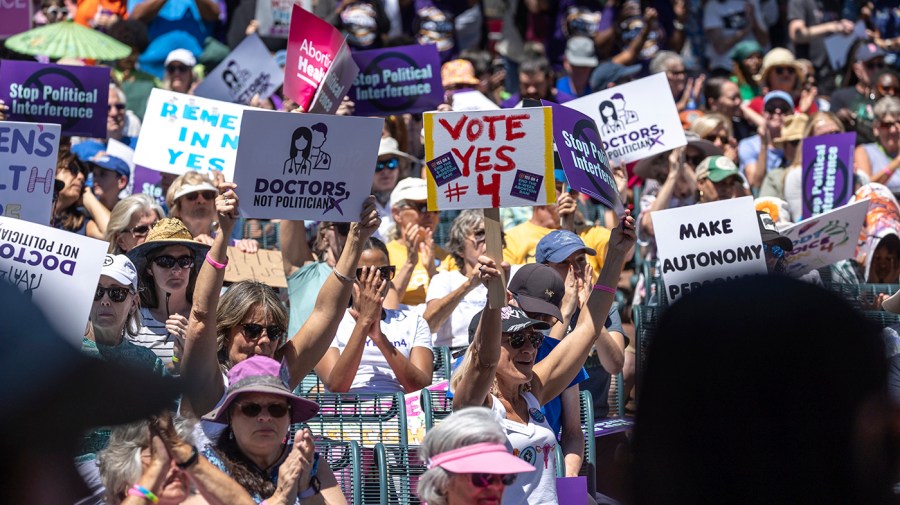Florida’s Department of Health is threatening local television stations with criminal prosecution if they do not stop airing an ad in support of an abortion rights ballot initiative.
The agency earlier this month sent cease-and-desist letters to every television station in the state that aired the ad, warning them that the ads contain false information and violate the state’s “sanitary nuisance laws.”
The chairwoman of the Federal Communications Commission on Tuesday said the threats from Florida government officials undermine the First Amendment.
“The right of broadcasters to speak freely is rooted in the First Amendment. Threats against broadcast stations for airing content that conflicts with the government’s views are dangerous and undermine the fundamental principle of free speech,” FCC Chairwoman Jessica Rosenworcel said in a statement.
The ballot initiative would enshrine abortion rights into the state constitution and overturn the current ban on abortion after six weeks of pregnancy.
The ad, sponsored by Floridians Protecting Freedom’s Yes on 4 Campaign, features a woman named Caroline who was diagnosed with brain cancer during her second pregnancy. Caroline made the decision to have an abortion so she could receive life-extending cancer treatment.
“Florida has now banned abortion, even in cases like mine. Amendment Four is gonna protect women like me. We have to vote yes,” Caroline says in the ad.
But Florida’s Department of Health said that description of the law is false.
The cease-and-desist letter, first reported by investigative journalist Jason Garcia, said the ad is “dangerous” because it could convince pregnant women they won’t be able to have an abortion if their life or health is at risk.
The letter, dated October 3, said the stations may commit a second-degree misdemeanor by carrying the ads, subjecting their employees to a 60-day jail sentence.
“While your company enjoys the right to broadcast political advertisements … that right does not include free rein to disseminate false advertisements which, if believed, would likely have a detrimental effect on the lives and health of pregnant women in Florida,” wrote DOH General Counsel John Wilson.
The state argued the current abortion ban has explicit exceptions to preserve the life and health of the pregnant woman.
If they are led to believe that such treatment is unavailable under Florida law, “such women could foreseeably travel out of state to seek emergency medical care, seek emergency medical care from unlicensed providers in Florida, or not seek emergency medical care at all,” the letter stated.
In response, attorneys for Floridians Protecting Freedom sent the TV station an Oct. 4 letter demanding that the ad keep running.
“This is not just an unfounded request, it is unconstitutional state action. The Letter is a textbook example of government coercion that violates the First Amendment,” the attorneys wrote. “The Department cannot criminalize media outlets running political advertisements with which it disagrees.”
In addition, the attorneys said the ad was correct.
“The Department may or may not honestly believe that its restrictions on reproductive healthcare are sufficient to protect women’s health. But that is not the lived experience of pregnant patients and doctors in states with abortion bans like Florida,” the group wrote.
None of the ads have been taken down to date, according to public FCC records.
The letters represent a further escalation from the administration of Gov. Ron DeSantis (R), which has already utilized taxpayer money to fight against the amendment.
A state-run website launched last month by the Florida Agency for Health Care Administration attacked the amendment.
In addition, reporting from Florida outlets found that the administration’s special election police had shown up at some voters’ homes to question them about the validity of their signatures on ballot petitions.
Last month, Florida health officials warned physicians that regulatory action will be taken against any providers who don’t offer abortions “at any stage in pregnancy” to save the life and health of the mother.
But doctors in states with abortion bans across the country say the laws contain too much uncertainty and don’t protect them if they need to perform an abortion.
In Florida for instance, emergency abortions can only be performed after two different physicians certify in writing that the abortion is necessary according to their “reasonable medical judgment” to save the pregnant woman’s life or avert a serious risk of “substantial and irreversible physical impairment of a major bodily function.”
As a result, stories about pregnant patients in medical distress being turned away from hospitals or being told to wait in a parking lot until their lives are in danger are becoming common.

